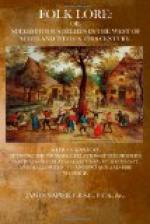Forty-six years ago, when cholera first broke out in this country, it was immediately proclaimed to be a judgment for a national sin; and so it was, but for a sin against physical laws. I well remember the indignation which arose and found expression in almost every pulpit in the country, when the Prime Minister of that day, in reply to a petition from the Church asking him to proclaim a national fast for the removal of the plague, told his petitioners to first remove every source of nuisance by cleansing drains and ditches, and removing stagnant pools, and otherwise observe the general laws of health, then having done all that lay in our power, we could ask God to bless our efforts, and He would hear us. All sorts of absurd causes were seriously advanced to account for the presence of this alarming malady. One party discovered the cause in a movement for the disestablishment of religion. Another considered it was a judgment from God for asking the Reform Bill. The Radicals proclaimed it to be a trick of the Tories to prevent agitation for reform, and added that medical men were bribed to poison wells and streams. The non-religious displayed as great superstition in this matter as did the religious. Large bills, headed in large type “Cholera Humbug,” were at that time posted on the blank walls of the streets of Glasgow. The feeling against medical men was then so intense, that some of them were mobbed, and narrowly escaped with their lives. In Paisley, considered to be the most intelligent town in Scotland, a doctor, who was working night and day for the relief of the sufferers, had his house and shop sacked, and was obliged to fly for shelter, or his life would have been sacrificed to the fury of the mob.




